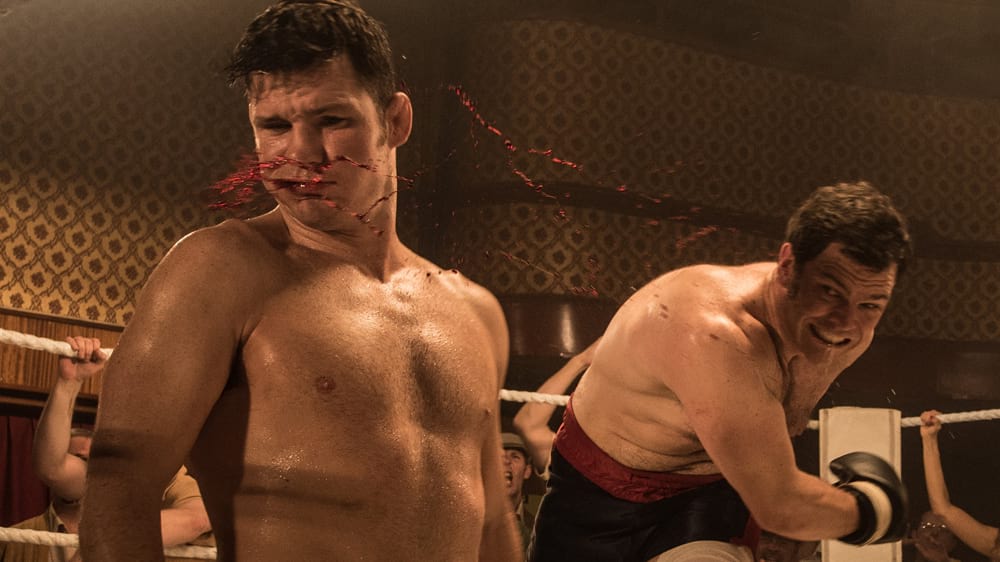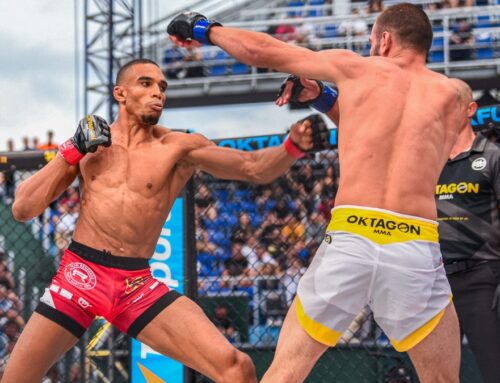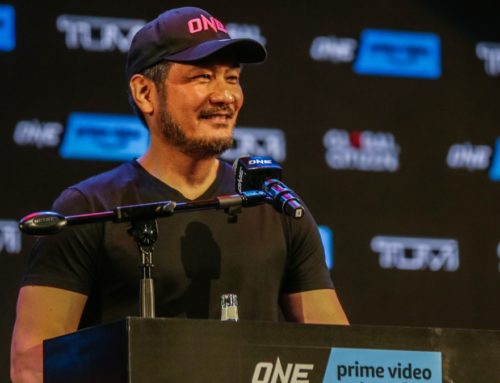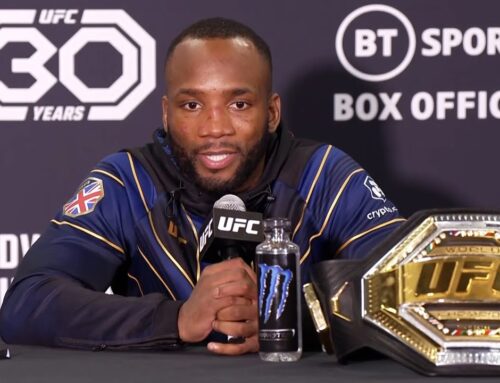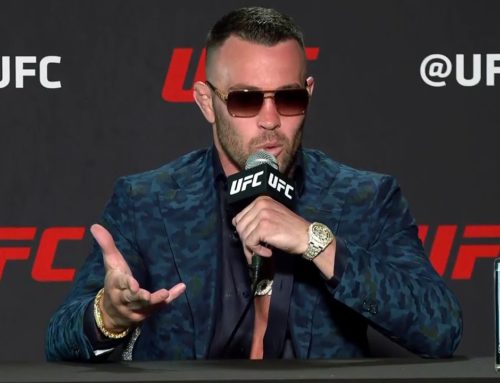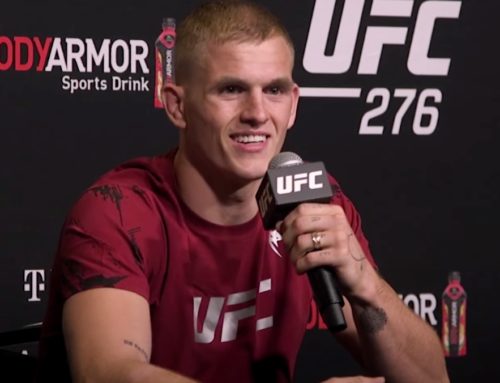Sometimes a defeat can be a good thing. Even the worst kind of the defeat: the sort of defeat that occurs inside the first round, I mean; in your home country, before your countrymen; a bloody one, a painful one. Even those kind of defeats can be good things.
For Irishman Cathal Pendred, a one-time UFC welterweight and now budding actor, defeat was definitely a good thing. Not at the time, of course, but certainly in the long-run.
Defeat, you see, has a way of cutting through the pretence, the romance and the hype and gets straight down to the truth, however cold or hard it may be. Often it hurts. The truth, that is. Often it hurts more than the punches and the kicks and the joint manipulation that led to it. But it’s important nonetheless and it forces a fighter to ask questions and perhaps make changes. It may even force them to re-think their career.
“I think I already knew before the Tom Breese fight,” said Pendred, speaking about his first round loss to Breese in Dublin two years ago, the fight which proved to be his last. “I’d started working on my business and was trying to open a restaurant. I was already thinking about my escape plan. The writing was on the wall for me and I decided to make the call after that fight.
“It takes something away from you as a fighter if you’re not fully invested in it. You need to be invested to keep performing at your best. If you’re not doing it because you love it, it won’t end well.
“I was very happy with how far I got in my career, especially with the lack of experience I had when getting into MMA, but I started enjoying it less and less and I was up for a new challenge, something fresh. It was just the right time for me.”
The dream of every fighter is to ride off into the sunset following a convincing win. But rarely is this ever the reality; nor do fighters have much of a choice in the matter. Defeats are and will forever be the most reliable instigator. It’s the only thing, after all, that can bring on introspection; wins merely fuel the delusion, thus prolong the career.
“Ideally I’d like to have gone out with another win,” said Pendred, “but if I’d have won that fight I probably wouldn’t have hung up the gloves. I’d have kept going even though I wasn’t enjoying it. I kind of needed the loss to provide that reality check and remind myself of the fact I wasn’t enjoying it.
‘It probably needed to happen like that. Wanting to go out on a win is not the sort of motivation you need to win a fight. I could have said I’ll do one more to ensure I go out on a win, which would have been beautiful, but I don’t think I’d have the right mentality if that was the case.”
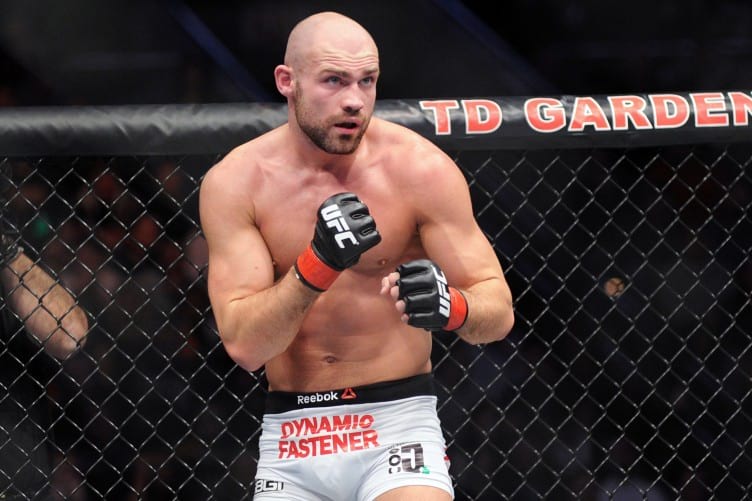
It wasn’t just the feeling of getting stopped inside a round in Dublin that made Pendred’s decision to retire a simple one. In addition to this, Pendred, unlike many who feel the urge but seem unable to act on it, was perfectly positioned to pull the trigger on his retirement because he knew exactly what he wanted to do next. Already, before the day had even arrived, he had a Plan B in place.
It wasn’t a mere quick fix, either. It wasn’t something he would use to whittle away time he once spent in the gym. Instead, Pendred saw acting, his Plan B, not as a passing fad – which is to say appear as an extra in a gangster movie and then forget all about it – but as a passion, a craft, a career. It was, in his eyes, easily interchangeable with fighting and would be approached with the same gusto, the same discipline and the same will to succeed. It had to be this way. He was retired, after all, at just twenty-eight years of age.
“Some fighters need to think about it a bit more because it’s a short career,” he said. “Unless you’re Conor McGregor, you’re not coming out of MMA set up for life. A lot of fighters go into coaching, but that wasn’t something I wanted to do. I was thinking more outside the box. I opened a healthy restaurant and also got involved in the acting. Even before I finished fighting I was doing classes and working on it, planning for the future.
“A little bit of foresight is something fighters need. I know there are fighters out there now who don’t really want to be doing it, who have lost their love for the game, but don’t know what they want to do next. That’s the problem. I was fortunate in the sense that I could plan what was to come next and knew exactly what I wanted to do. That made the transition so much easier for me.
“Also, the transitional period is always challenging, but I like a challenge. That’s why I got involved in MMA in the first place. I started with not too much experience and just relished the challenge. It’s the same situation I’m in now with the acting. I’m starting off fresh and I’m on a learning curve but I’m really enjoying it.”
The best thing about no longer fighting, Pendred says, is that a young life no longer revolves around a fight date. He has his time back, his freedom back – to eat, to enjoy, to live.
Old habits will ensure he still trains, but the key difference now is that he isn’t doing so with an end goal in mind. He isn’t consumed by the image and the name of an opponent and isn’t gradually de-humanising in an effort to whip his body into shape all the while stripping it of fat and muscle to make the 170-pound weight limit.
“My favourite part of being a fighter was the training – because of the camaraderie and the learning,” he said. “I’ve got the best of both worlds now. I’m training but am not having to prepare for a fight. When you’re fighting, it’s your whole life, twenty-four-seven. There’s very little time to do anything else.
“The great thing about the acting is if you don’t perform to your best, or if you feel you can do something better, you can ask the director for another take. In fighting, it’s live and there are no re-takes. There’s also a little bit less pain with acting.”
Perhaps fighting was only ever a stop-gap for Pendred, the gateway to something he has wanted to do for much of his adult life. Indeed, it was cinema, and Pendred’s love of martial arts movies, in particular, which first cultivated an interest in becoming a fighter (poignant, then, that it is cinema which has now ‘saved’ him and cut short a six-and-a-half year professional MMA career).
“The reason I got into martial arts was because of the movies I watched as a kid,” he explained. “I loved martial arts movies. I did the martial arts because of the movies I watched and now I’m doing the movie thing myself. It’s almost come full circle.
“I never had plans to fight forever. I actually retired very early and got into the acting sooner than I thought, but it’s always been something I wanted to do once I had finished fighting.
“Everything that comes my way I see as an opportunity to progress. Whether it was a title shot in Cage Warriors, or my first fight in the UFC, I saw it as an opportunity to progress and work my way up the ladder. It’s the same sort of thing in acting.
“From what I can see, and based on the progression I’m making, it’s a winning formula. I’m very happy with the way things are going. This is just the beginning of something great for me.”
Nowadays, when Cathal Pendred talks about “something great” he alludes not to fights or potential title shots but acting roles, films, the arts. Lore, for instance, Amazon’s adaptation of a horror podcast, is, he believes, something great.
“I’m the main guy in it,” said Pendred, who plays Michael Cleary in the series. “The director showed faith in me to pull it off and I was delighted with the way it went. A lot of stuff I’d previously done was action, tough guy stuff, but I was able to show a lot more of my range in this.
“I didn’t want to find myself going down the route of just doing action stuff. I wanted to do a whole range of stuff. I want to do drama, comedy, everything. So this was a great opportunity for me. The cast and crew were really impressed with how I did it and I’m looking forward to seeing the finished product now because I feel we’ve made something great.”
Closer to home, but presumably no less great, is My Name Is Lenny, another film in which Pendred appears; another indication things are moving in the right direction for a man who, unlike many of the other actors on set, boasts twenty-two professional fights to his name.
“I read Lenny McLean’s book, The Guv’nor, as a teenager,” he said. “Someone gave me the book and I’m still trying to remember who it was. I want to remind them they gave me the book and tell them I’m now in the film.
“I remember it being a very inspirational story. Lenny McLean had such a tough upbringing, with not a lot of opportunities. He did very well and made the most of his limited opportunities. He was a true fighter. To be involved in the telling of that story was really amazing and to meet his family was great. It was a movie made with passion and love.”
Pendred wasn’t the only guy on set playing make-believe in a world he has inhabited for real. Michael Bisping, the current UFC middleweight champion, was also, in his role as Roy Shaw, on set reciting and blurring lines.
“He’s a top guy,” Pendred said of ‘The Count’. “I’ve got a lot of respect for him. He’s done so many great things. If you look at his UFC record, it’s really under-appreciated. His career has been phenomenal. He was fighting in the UFC before I even started training MMA and he’s still there as the champion. It’s incredible. He’s got a great work ethic. It was really cool to work with him and see how well he’s doing in the acting world as well.”
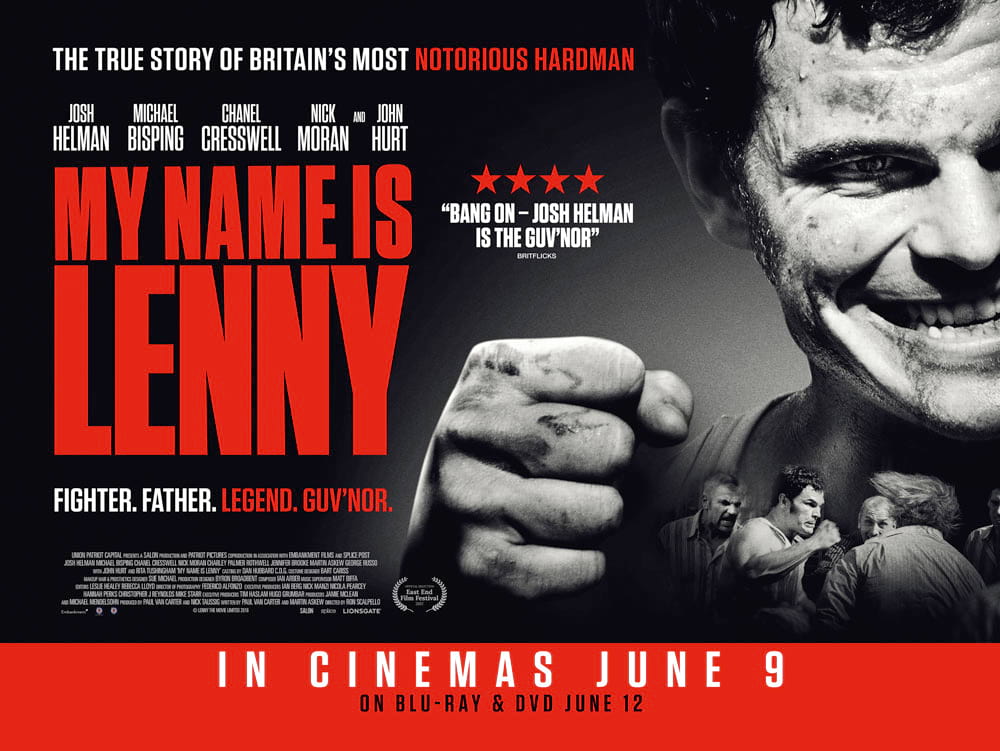
My Name Is Lenny is at the East End Film Festival June 9th and at Select Sites Nationwide. Also Available on Digital Download June 9th and DVD & Blu-ray from June 12th

